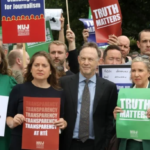For the first time in twenty years, governments are talking about inflation. Until now, the policy of the EU was to keep it to just 2% but it has risen over 5%. There is a good reason for governments to worry because it can lead to political disturbance. In Kazakhstan, for example, the government has called in Russian soldiers to crush protests over fuel prices.
The term inflation refers to a general rise in prices and it is measured by a Consumer Price Index. It is derived from a basket of about 600 items that are commonly purchased.
However, the Consumer Price Index in Ireland excludes a key item. It does not take proper account of house prices and instead measures only mortgage interest rates.
But Ireland is experiencing relatively low-interest rates and phenomenally high house prices. The Consumer Price Index will, therefore, underestimate real housing costs.
What Is Causing Inflation?
Conventional economists offer two explanations for inflation. They say that it can result from too many consumers chasing too few goods and services, causing prices to rise. They sometimes point to ‘lax’ government monetary policy as a reason.
By this, they mean that governments print too much money and, therefore, puts more spending power in people’s pockets.
The other reason, conventional economists argue, is that higher wages increase the cost of goods and services.
Neither of these explanations can account for the current wave of inflation.
Wage increases have been extremely moderate in the past decade. The Financial Times, for example, noted that ‘labour costs have risen by an average of just above 2 per cent over the past two years, in line with typical levels over the past decade’.
In Ireland, these effects were particularly pronounced. According to the European Commission, for example, labour productivity increased by 34% from 2010 to 2017, at the same time as nominal unit labour costs fell by 17%.
The wage share for workers fell from 53% of GDP in 2008 to 40% in 2016 – or from 53% to 49%, when the distorting effects of tax haven activity are stripped out.
Overall wage costs fell by 8% – mirrored by an increase in profits of more than 8%.
There has been some recovery in wages over the last year with the Central Statistics Office estimating average increases of 3.9%, but they also state that this is an unusually poor comparator due to changes in the composition of the workforce (the sectors in which people work have changed dramatically) and the existence of temporary schemes to support workers.
Wages in the multinational sector are likely to have increased significantly due to higher demand for pharmaceuticals, information technology, social media, and electronics, pulling up the average without the majority of workers feeling a real advantage.
Either way, wages have lagged productivity for a number of years and there is a general feeling among economists that inflation is not yet being driven by higher wages. So, workers cannot be blamed for the price rises.
The claim about a lax monetary policy sounds plausible at first because the European Central Bank has injected a staggering €2.2 trillion into the EU economy.
But unlike previous forms of Keynesianism, this flow of money has gone straight into banks and governments bonds. Ordinary people received limited support during Covid, but they did not earn more than normal. Irish wages are reported to have increased by 3.8% but this is not true in the public sector, and it comes after years of productivity outstripping wages for workers. According to the
Instead, the injection of cash led to low-interest rates and an orgy of speculation as big corporations borrowed money cheaply to play the financial and stock markets.
The Covid Effect
To understand why prices are rising now, you need to look at how global capitalism responded to the pandemic.
The system is built on a continual search for profits and has huge difficulties dealing with sudden slowdowns in economic activity. Instead of long-term planning for human needs, corporations seek to profit from short terms gains.
So, when economies slowed down, they immediately cut back on investment. This created ‘supply chain problems’ because in recent decades manufacturing is more dependent on sourcing the cheaper parts from around the world. They had become more vulnerable to sudden breakdowns anywhere.
Some of these breakdowns were caused by cutbacks in investment. Others arose because workers, who were tired of low wages, moved on. The overall result, however, has been a shortage of goods which pushed up prices.
The most important slowdown was in energy production which fell dramatically during the lockdown. As the economy has reopened demand has surged and energy prices have risen by an average of 26%. This feeds into utility bills and driving a car which has helped to drive inflation higher.
Even where these influences are less important, companies made every effort to recover lost profits by pushing up prices. Think of how a cup of coffee has suddenly jumped from €2 to over €3.
This also points to another feature of the Covid crisis – a rise in inequality. Although many people lost all or part of their wages, others were able to save. This created what economists call ‘pent up demand’ and as the economy has reopened many employers have capitalised on this by pushing up their prices.
According to the European Central Bank, for example, reopening the economy has led to economic growth and when an “economy is growing, businesses find it easier to raise prices without losing customers. This is what we are seeing today”
On top of all that, geopolitical tensions have grown as Nord Stream gas illustrates. This is a major pipeline that connects Russian gas to Germany, but it is being held up because of a renewed Cold War between the USA/ EU bloc and Russia.
So What Can Be Done?
The political establishment is claiming that the rise in inflation is ‘transitory’. This has been echoed by some union leaders who are frightened it might lead to more strikes as workers fight for higher wages.
But the rich do not believe the storyline about ‘transitory’ because they are investing in ‘inflation proofed’ bonds which are indexed to price rises.
Governments have power under consumer legislation to invoke maximum prices orders on certain goods. They could, for example, set maximum prices for home heating or fuel. They could also shift indirect taxes.
But the Irish government will do none of this because they are true believers in market fundamentalism. Remember how they refused to curb the price of antigen tests, with Donnelly claiming that only ‘the market’ could settle the issue.
This means that our only protection against price rises is to push for an increase in wages. This is already starting to happen in the North and in some companies in the South. Hovis workers in Belfast won a 9% increase after taking strike action. Dunnes Stores workers won a 10% rise after pushing for a Covid payment to be made permanent.
In the New Year, People Before Profit are encouraging workers to call special union meetings to demand an increase in wages that matches the level of inflation.
If you want any advice on how to do this, contact our Trade Union Department on 083 390 2063, or email [email protected].












